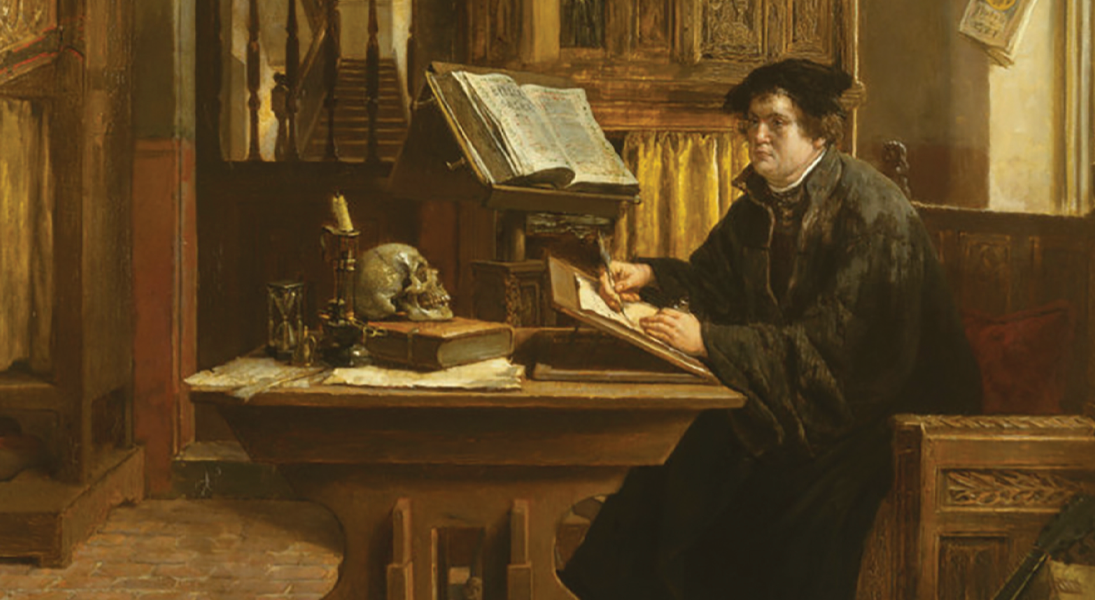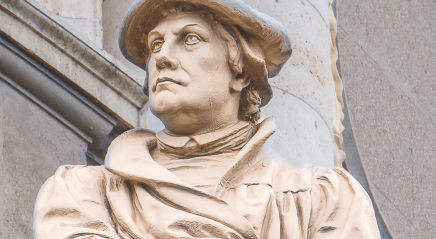You have been cooped up in this place for far too long, and it’s starting to show.
Rough stubble has started to grow where before you kept your skin smooth and freshly shorn. You’ve abandoned your regular clothing to fit your new surroundings, adapting to the changes forced upon you by the world. The pattern of the day has been disrupted as habits that marked out work and play, time for personal and spiritual growth, shifted. And, perhaps worst of all, you are disconnected from friends and colleagues. Writing quick notes to friends has made you realize how valuable long conversations over dinner or drinks are for sustaining relationships and lifting your spirits.
This could describe many of us living in the midst of COVID-19 in the 21st century. It could also describe an Augustinian friar trying to survive in 1521.
After his defiant encounter with imperial power at the Diet of Worms, Martin Luther was whisked away to Wartburg Castle. There he was hidden away to protect his life and the reforming movement that was growing out of Wittenberg and spreading throughout the land.
While fortunate to be alive, Luther hardly felt lucky for this time alone. Locked away for his own safety, his body, mind and soul were constricted as the days in hiding became weeks and months. In his letters from this time, he frequently complains about his plight and longs for a return to normalcy.
Our own desire that things return to “normal” is complicated. The better times pre-pandemic probably weren’t as rosy as we imagine.
Our own desire that things return to “normal” is complicated. Too often our picture of how things used to be is merely an exercise in wishful thinking or creative misremembering. The better times pre-pandemic probably weren’t as rosy as we imagine. Our limited perspective leads us to overlook the genuine challenges our neighbors near and far endured in those times when we thought everything was fine.
But we shouldn’t underestimate the value of normal and our longing for it. Luther wasn’t simply put off by this latest change in his daily schedules and life plans. Rather, he was perplexed and fearful about the future. The crises sparked by his theological convictions had provided him with a sense of passion and purpose, a knowledge that God was somehow working in and through him to speak the good news of freedom in Christ to all. Left on his own, he had to sit back and watch as others picked up his work and took it in new, and often disagreeable, directions.
Moved from the hot seat at the Diet of Worms to the back burner, Luther simmered and stewed.
One lesson we can pull from the ongoing COVID-19 pandemic is just how hard life can be when every task is made more difficult and every day is uncertain due to contagion. Sometimes we crave the ordinary because the extraordinary has left us exhausted. Finding time and space to collect ourselves, to know what is happening and what is expected of us, is a needed gift for our souls.
Luther knew in his mind, and felt in his heart, that the dynamic shifts of life can be moments where we can see and share in God’s work.
This is, in part, why Luther so praised the value of peace. He recognized all too well the toll that chaos and unrest can take, particularly on those who are already the most vulnerable in society. Whether discussing the individual or the communal, Luther lifted up the ordinary patterns of life as indispensable spaces for God’s work and our flourishing.
Eventually Luther made his way back to Wittenberg, and the Reformation movement continued. But it’s hard to say if his life ever returned to the way it was pre-pandemic. Rebellion erupted and Luther’s muddled response to the political exploitation of peasants revealed his shortcomings and weakened his standing among common people. Luther walked away from his religious vows and learned firsthand what kind of extraordinary chaos comes from becoming a husband and a father through his marriage to Katie von Bora.
And, while it was challenging taking on the role of prophet, critically railing against the corruption and degradation of the late medieval church, he quickly learned how much more burdensome the work of building up the church can be as he and his colleagues found themselves responsible for guiding burgeoning Protestant communities.
What came before COVID-19 may not come again as life continues to move forward along paths unknown and unpredictable. Luther knew in his mind, and felt in his heart, that the dynamic shifts of life can be moments where we can see and share in God’s work. An idle God will never surprise us, and an idol will fix our gaze on the past. But a living God is perpetually in motion.
While going back to normal is not an option, before us lie opportunities to move forward with our God who is always reforming us.








